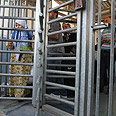
World Bank: Israel limits harm PA economy
International monetary institution says Israeli policies causing contraction in Palestinian manufacturing and agricultural sectors, 'alarmingly' high unemployment and social problems that will outlive any peace agreement
The policies are causing a contraction in manufacturing and agricultural sectors, "alarmingly" high unemployment and social problems that would outlive any Israeli-Palestinian peace agreement, the organization said in its report.
Tuesday's report said deteriorating water and transport infrastructure were also serious problems, particularly in Gaza.
Israel officials cite security concerns for restrictions.
The report said economic problems were exacerbated by shortfalls in donor aid, forcing the Palestinian Authority to borrow unsustainable amounts from local banks to stay afloat.
The report said the small Palestinian economy has slowly unraveled over nearly 20 years, with exports falling from 10% of the economy in 1994 to just 7% today, one of the world's lowest levels.
The report was issued ahead of a donors meeting in Brussels on March 19.
Since the Oslo peace accords with Israel, Palestinians have exercised limited autonomy in the West Bank, but a final peace has not been reached.
Following a deadly uprising in 2000 defined by Palestinian suicide bombings and Israeli incursions, Israel implemented stricter curbs on the movement of Palestinian people and goods.
Almost a quarter of Palestinians in Gaza and the West Bank are unemployed, contributing to shrinking productive sectors.
"The longer the current, restrictive situation persists, the more costly and time-consuming it will be to restore the productive capacity of the Palestinian economy," the World Bank said.
Palestinian hopes to build economic institutions capable of sustaining a hoped-for state have withered as the curbs persist.
Real GDP growth has slumped from a high of 11% in 2010 and 2011 to 6.1% in the first three quarters of 2012, according to the Palestinian Central Bureau of Statistics.
Violent protests against government austerity measures rocked West bank cities last September, and strikes have repeatedly jarred the public sector.
The Palestinian economy is bound closely to Israel's through infrastructure and trade and has few foreign trading partners.
In 2011, Israel received 86% of Palestinian exports and provided 73% of its imports, a situation the World Bank called "atypical."
Combined with the low rate of 17% employment for women, the World Bank said the atrophy of job skills will likely haunt Palestinians into the future.
"A skilled labor force is one of the key factors that any potential foreign investor would consider in deciding whether to invest in the Palestinian Territories even after a political solution has been realized," it said.
The Associated Press and Reuters contributed to this report










